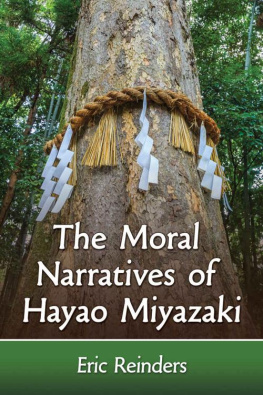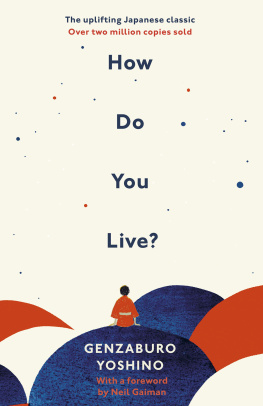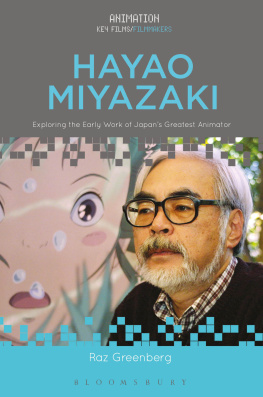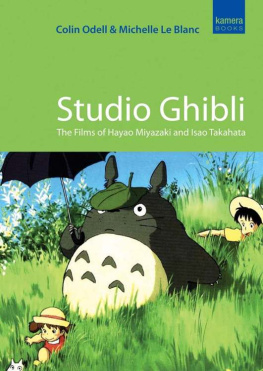The Moral Narratives of Hayao Miyazaki
ERIC REINDERS

McFarland & Company, Inc., Publishers
Jefferson, North Carolina
e-ISBN: 978-1-4766-2679-6
LIBRARY OF CONGRESS CATALOGUING DATA ARE AVAILABLE
BRITISH LIBRARY CATALOGUING DATA ARE AVAILABLE
2016 Eric Reinders. All rights reserved
No part of this book may be reproduced or transmitted in any form or by any means, electronic or mechanical, including photocopying or recording, or by any information storage and retrieval system, without permission in writing from the publisher.
Front cover photograph of the Divine Tree at the Ujikami-jinja Shrine in Kyoto 2016 iStock
McFarland & Company, Inc., Publishers
Box 611, Jefferson, North Carolina 28640
www.mcfarlandpub.com
Table of Contents
Acknowledgments
I have taught a first-year seminar on all the films of Miyazaki four times: fall 2010, spring 2012, spring 2015, and fall 2015. And I have dealt with two or three of the films in my classes on Religion and Fantasy, fall 2006, fall 2007, fall 2009, fall 2011, and fall 2014. Certainly there have been moments when a student said something and Ive thought: thats good, Ill put that in my book. But over several years of open discussion, it is impossible to keep track of these fragments. Still, I would single out Josh Patashnik, who carefully read and helpfully commented on early drafts of four chapters.
Wendy Farley and Pam Hall helped me think through storytelling, especially as an ethical practice. Cheryl Crowley and Noriko Takeda helped with questions of Japanese language and culture. Megan Friddle helped me think about adolescence in comparative terms. Fabio Rambelli guided me with a number of points related to Shinto and politics. I had a helpful, lively argument with Dana Sawyer about myth. Also thank you to Joy Wasson and indeed the entire staff of the department for many kindnesses.
As always, Vian Gold has been a constant friend to this and all my projects.
It might seem redundant, but nonetheless I dedicate this book to Miyazaki.
Introduction:
What Does a Story Mean?
Youve seen at least one of Miyazakis filmsotherwise, why are you even reading this book? I assume that the majority of this books readers have seen at least a few of his films, and that a few readers have seen all ten:
Nausica of the Valley of the Wind
Laputa, Castle in the Sky
My Neighbor Totoro
Kikis Delivery Service
Porco Rosso
Princess Mononoke
Spirited Away
Howls Moving Castle
Ponyo
The Wind Rises
If you havent seen them all, a spoiler alert is in order. So, you might start by just watching all the films, before you read any further. Put a bookmark right here, and come back later.
A Religious Reading?
My field is religious studies, so Im going to read these films as religious textsbut what do I mean by that? Are they the word of God? The films do show us god-like beingssome fictitious, and others believed to be real. We might indeed treat the films as scripture, as the Truth, with all the reverence, over- and under-interpretation that scripture-reading sometimes entails. I imagine if Miyazaki thought I was taking his films as my Bible, hed utter one of his famously cranky remarks about otaku (dweebs). How would he feel about being the prophet of a new religion? Why not? Star Wars has generated an actual Jedi church, so who knows?its conceivable some might consider Miyazakis films a divine revelation, and such like-minded people would gather in basements to bow to pictures of the Great Sensei. If you do a web-search on Miyazaki is god, you get rather a lot of hits. Much to his horror, no doubt!
Just to be quite clear, I dont take these films as the word of God. My religious reading of the films will not rely on any theology. Besides, Im an atheist.
In my religious reading of the films, I am not thinking of institutional religions, nor thinking only of gods, but rather of religion as a general term for how we deal with fundamental problems and give our lives meaning. Religion here is a short-hand word for our many attempts to put ourselves into larger moral narratives. How we find ourselves in meaningful stories. I am not looking for a theology in these films, nor for a systematic philosophy. Im looking for something more useful than that: images of human life, tools which I can add to my toolbox of meaning.
In these films, we see certain real religionsBuddhism, Shinto and Christianitywhich receive no absolute endorsement nor rejection. Miyazaki is not representing any sect or institution. Nonetheless throughout most of the films, there is a pervasive atmosphere of animism. Miyazaki said, I do like animism. I can understand the idea of ascribing character to stones or wind. But I didnt want to laud it as a religion. Traditionally, the term animism refers to a belief that the natural world, including animals and supposedly inanimate objects, possesses a spiritual essence or consciousness. Even certain rocks show some measure of sentience, as in Laputa when Uncle Pom says, Rocks speak very softly. Miyazakis animism is heavily accented with postWar Shinto, but also deep ecology and a Romantic sense of the sublime. We will deal with Miyazakis relation to Shinto when we get to Princess Mononoke. For now, lets just say Miyazaki is a Shinto-ish storyteller. So the films have real religious references, but are not about religion in an institutional sense.
Interpreting Stories
So what are these films about? Actually, what is any story about? Surely saying a story is about such-and-such a specific moral point reduces its complexity to a simplistic motto. Certainly we may say that Nausica is about trusting the forces of nature, or Spirited Away is about gaining maturity during adolescence. Well, yes, sure, but so what? It makes the films sound a bit banal. And yet, like it or not, we all have basic perceptions about the moral of a story, about the point a films making. Stories are always about something, whether we know it or not. You need to understand what stories are saying to you, because all stories say something.
Picture yourself when youre enjoying a filmyoure totally at its mercy. You are immobilized and hypnotized. You let down your guard. Your mind becomes more receptive, more suggestible, and also more vulnerable. You follow the story. The story leads you. Plot structures reinforce a sense of morality, because we think of right and wrong in terms of stories. If the moral of the story is presented as a simple proposition, we can argue with it. But when a story controls your mind, you willingly suspend your disbelief.
Stories are so meaningful in our lives precisely because stories are not life. Stories are inevitably reductive. They reduce the totality of what might be said to just this particular line in the text. A story is the result of extreme editing. The simplification of reality combined with the intensified meaning makes a story resemble a cartoon or an icon of real life. Yet these few, bare words somehow conjure up a whole other world, far larger in our minds than just the words weve heard. The creation of a story reduces all possibility to just a few words, and the consumption of those words explodes into a universe.
These iconic depictions of human experience do resemble reality, and so we are able to analogize them to our own lives. We make the story a part of our selves. A moment in the film feels like a moment in your life, and when you make that connection consciously, you see those moments differently. You say, Im feeling






